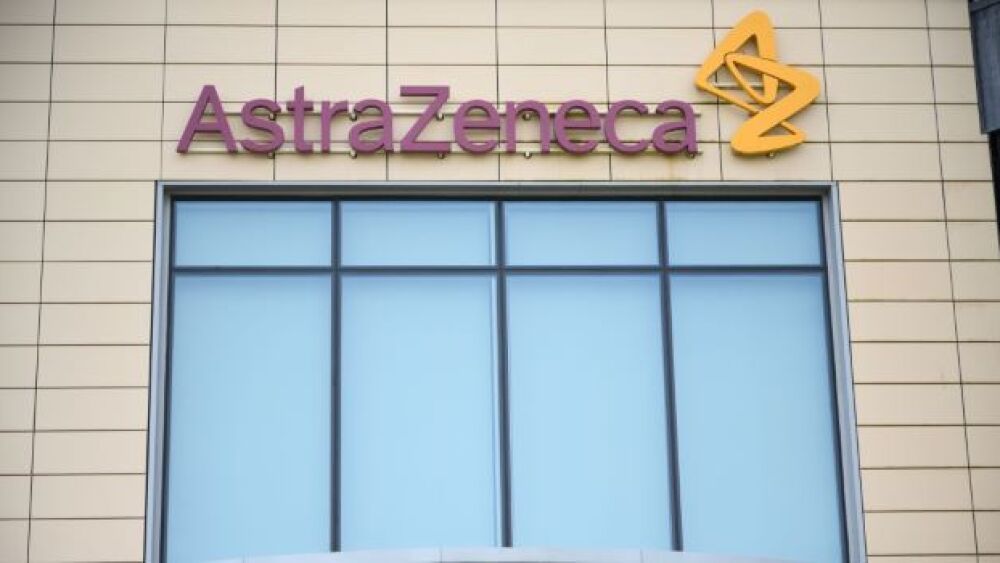Studies found that AstraZeneca’s EVUSHELD was still effective against the Omicron variant. EVUSHELD is a long-acting antibody combination made up of tixagevimab and cilgavimab.
Leon Neal/Getty Images
Two new studies from University College Oxford, UK and Washington University School of Medicine in St. Louis found that AstraZeneca’s EVUSHELD antibody treatment was still effective against the Omicron variant. EVUSHELD is a long-acting antibody combination made up of tixagevimab and cilgavimab.
In the Oxford study, EVUSHELD’s Inhibitory Concentration 50 (IC50), a way of measuring the neutralizing potency of an antibody, was 273 ng/ml. In the Washington University study, the IC50 was 147 ng/ml. Both levels are within the range of neutralizing antibody titers in people who had COVID-19 and recovered naturally.
The studies were conducted in the laboratory, but unlike many earlier studies that utilized synthetic spike protein (pseudovirus) representing the Omicron variant, these studies used actual live viruses isolated from people who contracted the COVID-19 Omicron variant. AstraZeneca notes that EVUSHELD is “one of only two antibody therapies authorized for use that showed neutralizing activity against Omicron and against all other variants of concern in these two studies.”
The data from the two studies are consistent with a study conducted by the U.S. Food and Drug Administration (FDA) and announced on December 16. In that study, EVUSHELD’s IC50 was 171 ng/ml and 277 ng/ml. That study used a pseudovirus of the full Omicron variant spike.
“Consistent data across three independent studies now provide confidence that EVUSHELD, a combination of two highly potent antibodies, retains neutralizing activity against the Omicron variant at a level that will continue to provide benefit to patients,” said Mene Pangalos, Executive Vice President, BioPharmaceuticals R&D, AstraZeneca. “EVUSHELD is the only antibody therapy authorized for pre-exposure prophylaxis of COVID-19 in the U.S., and we’re excited that EVUSHELD is now available to help protect vulnerable populations, such as the immunocompromised, who are unable to mount an adequate response to vaccination and who remain at high risk for COVID-19.”
EVUSHELD’s original clinical trials were conducted before Omicron arose. The therapy received Emergency Use Authorization (EUA) in the U.S. in December 2021 for pre-exposure prophylaxis of COVID-19 in people with moderate to severe immune compromise.
Other studies suggest that two other antibodies appear to be able to battle Omicron, sotrovimab by Vir Biotechnology and GlaxoSmithKline, and DXP-604, which was developed by Beijing-based BeiGene and Singlomics, and which is currently in clinical studies in China.
Although this is good news, there have been reports of a shortage of other monoclonal antibodies in various sites around the country leading into the holidays. For example, Miami-Dade County in Florida indicated the Regeneron monoclonal therapy was exhausted, and four monoclonal antibody treatment sites in the state had been temporarily closed Tuesday. Michigan has also reported that the state has limited monoclonal antibody therapies in stock.
“Demand has been incredibly high,” said Dr. Nick Gilpin, medical director of epidemiology and infection prevention at Beaumont Health in Southfield, Michigan, on Tuesday, Dec. 21. “And so, there is a bit of a supply-demand mismatch.”
Yesterday, the FDA granted EUA to Pfizer’s Paxlovid (nirmatrelvir and ritonavir tablets) for high-risk adults and pediatric patients 12 years and older. It is the first oral antiviral authorized against COVID-19 in the U.S. In the Phase II/IIII EPIZC-HR study of Paxlovid, the antiviral combo reduced the risk of hospitalization or death by 89% compared to placebo in non-hospitalized, high-risk adults with COVID-19 within three days of symptom onset, and 88% if the regimen was started within five days of symptoms. The drug is 30 tablets given over five days.
And today, the FDA granted an EMA to Merck’s antiviral tablets, molnupiravir, for treatment of mild-to-moderate COVID-19 in certain adults at high-risk of severe disease.





